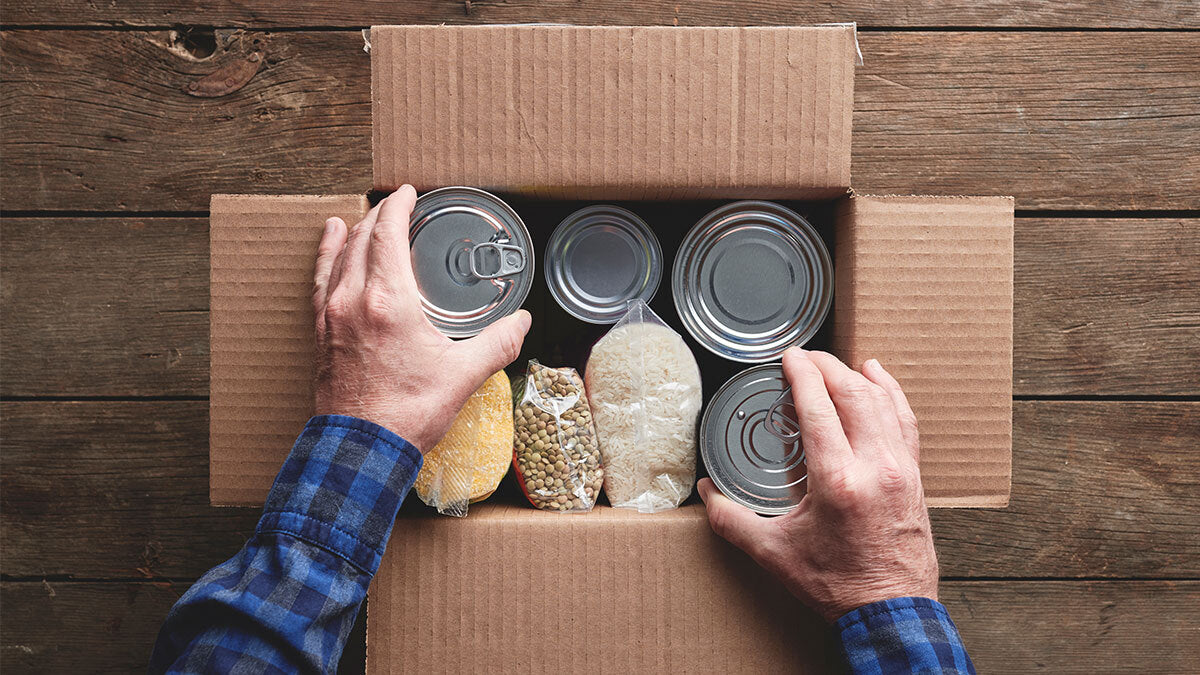Every September during National Preparedness Month, we encourage our readers (and customers) to stock up on emergency food, gather first aid supplies, and make sure they have a plan in place should the worst happen.
While this is valuable information, you already know a lot about that—as most of you already practice preparedness.
But what do you do with the stuff you can't use? What do you do with those long-sitting emergency supplies?
What if your family can’t eat through all your emergency food supply before it expires? What about all those medications or gasoline cans you stockpiled?
Knowing how to repurpose these supplies is the difference between a novice emergency prepper and a pro prepper.
Keep reading for ways to use your expired emergency items instead of tossing them.

How to Use Expired Emergency Food
Many families stockpile nonperishable food items, such as canned goods, for emergencies.
However, canned goods tend to have a “use by” date stamped on them.
The good news is that the “use by” date is NOT the same thing as an expiration date.
The “use by” (or “sell by”) date is simply an indicator of best quality. You can safely consume canned goods well past these dates. They may not taste as good, but they won’t harm you.
Even the government advocates not going by the “use by” or “sell by” date.
According to the U.S. Department of Agriculture, “Dates on cans indicate peak quality as determined by the manufacturer. So don’t automatically pitch a can with an expired date. You can safely keep commercially canned foods longer than their dates. Low-acid foods (such as canned meat, poultry, fish, stew, soups, green vegetables, beans, carrots, corn, peas, potatoes, etc.) can be stored for two to five years.”
With that being said, there may come a time when your canned emergency food stockpile has reached its end.
But that doesn’t mean you should throw it out!
Here are a few ways to repurpose non-edible emergency food:
Before we move on to other emergency items, it’s worth mentioning the importance of investing in long-term emergency food supplies.
Unlike canned goods, long-term emergency food is designed to last for 10, 25, and 30 years. You can purchase it, set it, and forget it for the next decade or two… or three.
[Related Read: The Science of Shelf Life and How to Slow It Down]
How to Repurpose Gasoline
Over time, gasoline degrades and loses some of its combustibility to fire an engine. This means it's no longer effective.
But that doesn’t mean it can’t be used.
If you suspect your gasoline has gone bad, you can test it by smelling it or comparing its color to fresh gas. If the color is darker or smells sour, it has expired.
The good news is that you don’t have to toss it. You can simply repurpose it by adding fresh gas to it.
The process of diluting the old gas with the fresh gas should get the engine firing again.
Bob Vila recommends, “For a small tank of 9 or 10 gallons that reads at least ¾ full, according to the fuel gauge, add a half-gallon of old gas to the tank. Use a proper ‘jerry can’ (a gas jug with pouring spout) to slowly pour the old gas into the tank. Eyeball the gas level as you fill it, and stop when the tank is filled to just below the tank mouth’s safety flap. […] Similarly, you can add ¾ of a gallon of old gas to nearly full 12-gallon tanks, or a full gallon to 16-gallon tanks.”
Stay safe by working with expired gasoline and fresh gasoline outdoors only.

How to Repurpose Old Food Containers
If your emergency food has expired, don’t throw out the containers! You can repurpose them in a variety of ways.
[Related Read: 10 Emergency Uses for an Empty #10 Can]
How You Can Use Expired Medicine
Did you know some states require pharmacists to put an expiration date of one year from when the prescription was written—even though there is no proof the medication will expire? It’s true.
According to one scientific report, “Most drug expiration date information is from the study conducted by the Food and Drug Administration at the request of the military. With a large and expensive stockpile of drugs, the military faced tossing out and replacing its drugs every few years. What they found from the study is 90% of more than 100 drugs, both prescription and over-the-counter, were perfectly good to use even 15 years after the expiration date.”
In other words, most of the medicine you have in your first aid supply can be used long past its expiration date.
It may not be quite as effective, but in an emergency, slightly-less-effective ibuprofen is better than no ibuprofen.
Moreover, studies have found that solid medications, such as tablets, are more stable than liquid.
Dr. Forgey, the author of The Prepper’s Medical Handbook, explains, “One thing I try to point out in the book is that medications have an incredibly long shelf life. There have been numerous studies done with medications that have been packaged for use in civil defense. For example, many antibiotics have been stockpiled for over a decade and under not exactly ideal circumstances.
“I would never be worried about a medication. I do talk about certain medicines in my book that do degrade. But even though a medication like epinephrine does degrade and turn brown, you can still use it in an emergency.”
[Related Read: The 5 Emergency Meds You CANNOT Live Without]
Don’t Throw It Out!
Think carefully before you throw away food, food containers, medicine, or any other supplies you have in your stockpile. You may toss something that would still prove helpful in an emergency, or you may miss an opportunity to repurpose the item in a useful way.

